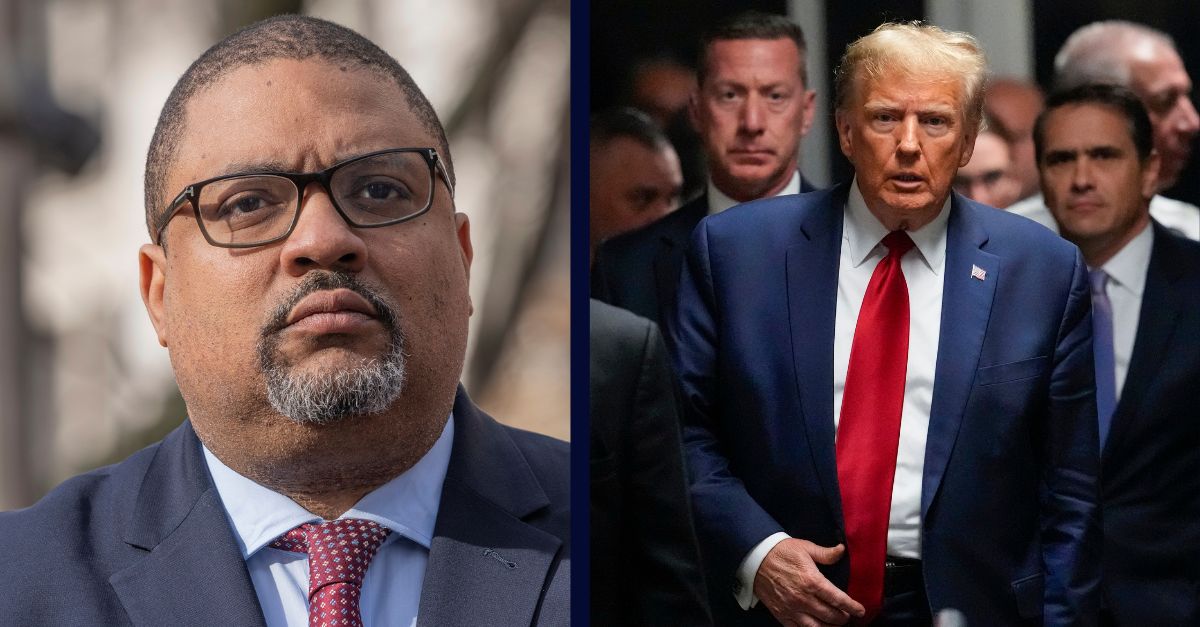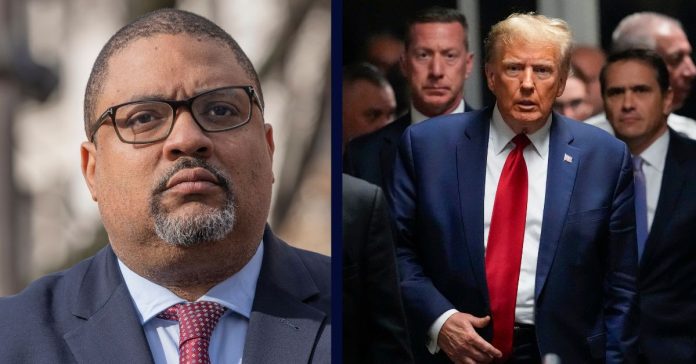
Left: Manhattan DA Alvin Bragg attends a press conference on illegal guns arrests and seizure on the plaza in front of Police Headquarters on December 4, 2023. (Lev Radin/Sipa USA)(Sipa via AP Images). Right: Former President Donald Trump leaves Manhattan criminal court, Thursday, Feb. 15, 2024, in New York. (AP Photo/Mary Altaffer)
An extensive history of public and repeated attacks on trial jurors and grand jurors by Donald Trump was cause enough for a judge in New York to issue a protective order over the names of jurors who will soon weigh allegations that the former president falsified records to cover up hush money payments he made to a porn star ahead of the 2016 election.
The order from Manhattan Judge Juan Manuel Merchan will block the juror’s names and information from the public view but Trump and his attorneys as well as prosecutors will still have access to the information. Typically, juror names are public record but when a potential threat might be posed to their safety as a result of the charges being tried or individuals involved, they can be sealed.
In the case of Trump, Merchan wrote that the court found sufficient cause to believe there “is a likelihood of bribery, jury tampering, or of physical injury or harassment of juror(s).”
“As requested by Defendant, this Court will take reasonable precautions to minimize any potential prejudice to either party. The precautions may include, but not be limited to, not disclosing the existence of the protective measures unless absolutely necessary to allay juror concerns, providing neutral explanations for the procedures and giving appropriate jury instructions,” the order states.
Merchan has given prosecutors and Trump until March 15 to file any proposed explanations or limiting instructions they may have on how to limit prejudice to either party, and if they come to a stalemate over the language, then each party must submit their own proposals no later than March 18.
The order also makes clear that the press and public will still have access to the courtroom for jury selection proceedings, which is also typical.
When Trump faced E. Jean Carroll in the defamation case in New York, on both occasions juror names were totally secret from Trump. In this trial, he will have access to their names as well as their addresses and places of employment.
Ahead of Thursday’s rulings both prosecutors and attorneys for the former president were also waiting to learn whether the judge would impose a gag order. At Trump’s arraignment last April, he was warned not make incendiary remarks about the case publicly.
“Defense counsel speak to your client and anybody else you need to and remind them to please refrain … from making statements that are likely to incite violence or civil unrest,” the judge said at the time, according to a partial transcript from the arraignment contained in Merchan’s order.
The judge had also cautioned Trump against making any statements that would “jeopardize” the safety of the court’s proceedings or any individual.
In Thursday’s order, the judge went to the effort to include two instances where the former president openly stated that he understood he was not to make “disruptive” comments when he appears for proceedings and if he did, he waived his right to attend. Merchan stressed to Trump and his attorneys then that he was “bending over backwards” to allow him the right to speak freely as he advances his campaign for the White House in 2024 and as the trial progressed.
But there were limits he expected would be respected.
“He’s certainly free to deny the charges. He’s free to defend himself against the charges. He’s free to campaign. He’s free to do just about anything that does not violate the specific terms of this protective order,” Merchan said last April.
For now, however, the judge issued a warning only:
ORDERED, that a decision on the People’s motion for this Court to explicitly provide notice to Defendant that any harassing or disruptive conduct that threatens the safety or integrity of the jury may result in forfeiture of Defendant’s access to juror names is reserved pending this Court’s decision on the People’s motion for an order restricting extrajudicial statements.
As it stands, Trump and all other parties are “reminded” that he can speak on the “vast majority of the evidence” because most of it came from Trump’s own defense. But “attacking individuals, disclosing names, addresses, cell phone numbers, identities, dates of birth, or anything along those lines,” Merchan said last year.
“That’s just not necessary to advance his campaign,” he said.
Read the judge’s order here.
Have a tip we should know? [email protected]

